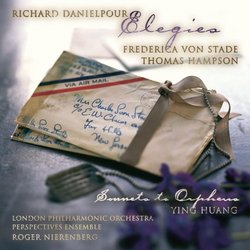Beautiful Contemporary Music
Dr. Christopher Coleman | HONG KONG | 07/12/2001
(5 out of 5 stars)
"Lovely lyrical writing opens American composer Richard Danielpour's Elegies for mezzo-soprano, baritone and orchestra. Heavily influenced by the music of Gustav Mahler, Richard Strauss, and Benjamin Britten, Danielpour's music is representative of the reactionary trend away from the twin worlds of dissonant, hypercomplex music and aleatoric, chaotic music of the academic world from the 1950's through the 70's. Danielpour, a graduate of the Julliard School of Music, composes music which is primarily melodic and whose harmonies are derived from an in-depth knowledge of tonality, even if that tonality is often expanded beyond romantic norms. The second movement, Lacrimosa, especially calls to mind Benjamin Britten's War Requiem, and the final movement, In Paradisum, suggests the ending of Richard Strauss's Four Last Songs.The performances on this CD are uniformly gorgeous. The Perspectives Ensemble and the London Philharmonic Orchestra, both led by conductor Roger Nierenberg, provide superb support for the vocal soloists. Mezzo-soprano Frederica von Stade, baritone Thomas Hampson, and soprano Ying Huang wonderfully complement Danielpour's lyricism with their vocal gifts. In fact, von Stade contributes quite a bit more to this CD than just her singing talent; the genesis of Danielpour's Elegies began with the singer. Frederica von Stade's father was killed in World War II, before she was born, and she had longed to know him, but the only way for her to do so was through the reminiscences of others and the letters he had written to his wife. She suggested to conductor Roger Nierenberg that a song cycle based on those letters be composed; Nierenberg suggested Danielpour; and Danielpour enrolled poet Kim Vaeth to adapt those letters into a musically useful form. How those adaptations derive from the original letters is not at all clear from the information given, however. The companion work to Elegies is Danielpour's setting of Rainier Maria Rilke's Sonnets to Orpheus, for soprano and chamber ensemble. This piece is quite similar to the first work, although a bit more light-hearted in places, and Chinese soprano Ying Huang performs beautifully. Her enunciation of the English texts even surpasses that of American Frederica von Stade. Ying Huang may be known to audiences from her performance in the title role of Frédéric Mitterrand's 1995 film of Puccini's Madame Butterfly. Unfortunately the names of the other musicians are not provided--in particular the french horn player deserves mention.Listeners may notice that the actual climaxes of this very dramatic music are performed exclusively by the orchestra, and the vocalists do not participate. This is the one criticism I have of the works--Danielpour's vocal writing is certainly exquisite, but he seems to undercut the drama of his music somewhat by omitting any real vocal climax. Other listeners may also find that too much of the CD is introspective in nature, but given the subject matter of the works contained this seems inevitable. Regardless of these minor criticisms, this is a wonderful disc, and I will be listening to it repeatedly."
Perspectives Ensemble musicians
NY musician | New York, NY USA | 07/18/2001
(5 out of 5 stars)
"I am the artistic director of the Perspectives Ensemble, which performed the Sonnets to Orpheus by Richard Danielpour on the Elegies/Sonnets Sony CD. Regrettably, Sony did not include the names of our individual musicians in the program booklet. Thank you to the reviewers who enjoyed our performance and commented on that omission. The musicians are: Diane Walsh, piano; David Jolley, french horn; Erica Kiesewetter and Adela Pena, violins; Nardo Poy, viola; Julia Lichten, cello; Jordan Frazier, bass; Sato Moughalian, flute; Alan R. Kay, clarinet; Paul Hostetter, percussion."
Orpheus' Journey
Etienne ROLLAND-PIEGUE | Tokyo, Japan | 03/05/2006
(5 out of 5 stars)
"Richard Danielpour has carved himself a special place in contemporary music. He has won just about every award there is, and has attained a recognition seldom matched by a living American composer. Most of the performances of his music are done by mainstream ensembles and soloists on programs with more standard repertoire rather on specifically "new music" concerts. A major record label granted him exclusivity and exposed his productions to worldwide fame.
Part of Danielpour's success is due to the peculiar relationship he entertains with the past. He does not feel the need to distance himself from tradition, nor does he follow it blindly. His music reenacts a bygone era when newly produced music dominated the old and encompassed it as an ancillary part. For him, it is only natural that living musicians should accede to stardom status: it has always been the new, the young and the contemporary who have captured the imagination of the people more than any dead composer could.
The two compositions recorded on this album both display the same elegiac quality with respect to the past. Both depict a journey to recover a lost memory and are a testimony to the persistent presence of the dead among the living. In Elegies, Mezzo-Soprano Frederica von Stade honors the father she never knew by bringing to life letters that he wrote to his wife during the war. In Sonnets to Orpheus, Soprano Ying Huang interprets Rainer Maria Rilke's poetry with an impressive range of skills.
True to the myth of the Greek poet who follows his lost lover beyond death and brings her back from below, the composer gathers materials from the past and rearranges them with his lyre to create a sense of community between the present and the dead."

![header=[] body=[This CD is available to be requested as disc only.]](/images/attributes/disc.png?v=15401716)
![header=[] body=[This CD is available to be requested with the disc and back insert.]](/images/attributes/disc_back.png?v=15401716)
![header=[] body=[This CD is available to be requested with the disc and front insert.]](/images/attributes/disc_front.png?v=15401716)
![header=[] body=[This CD is available to be requested with the disc, front and back inserts.]](/images/attributes/disc_front_back.png?v=15401716)

 Track Listings (11) - Disc #1
Track Listings (11) - Disc #1